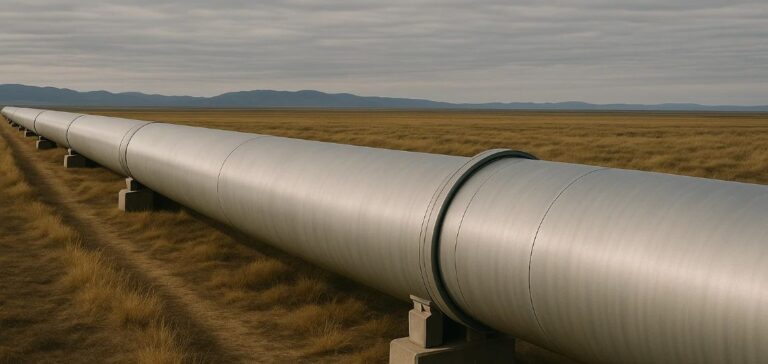Tallgrass Energy plans to construct a new pipeline directly connecting the Permian Basin, a major natural gas production region, to the Rockies Express Pipeline (REX) network. The project, for which initial commercial agreements have already been secured with several significant shippers, is expected to enter service by the end of 2028. Ultimately, the pipeline could offer a maximum transportation capacity of up to 2.4 billion cubic feet per day (Bcf/d). However, the final capacity will depend on additional commitments obtained during an upcoming commercial open season.
An Enhanced Natural Gas Transportation Network
The future pipeline will directly connect to the Rockies Express network, which currently operates between the Rockies and the Midwestern states. Tallgrass Energy has not yet provided exact details of the pipeline’s route but has confirmed that it will ensure the supply of natural gas to several major delivery points, without specifying the targeted markets. The company also indicated that it will soon launch another commercialization phase to secure additional commitments from other gas market participants.
The announcement comes at a time when Permian Basin producers are actively seeking solutions to deliver their increasing natural gas volumes to various U.S. markets. Several new pipelines scheduled to start service as early as 2026 will significantly increase the basin’s export capacity toward the eastern and southeastern United States. Tallgrass Energy’s planned pipeline differentiates itself by directly linking the Permian Basin to major interstate infrastructure, thus opening a new transportation corridor to the Midwest.
A Dynamic Competitive Environment
This project takes place within a highly competitive environment marked by the arrival of several new gas infrastructure projects in the coming years. For example, the Blackcomb pipeline will add an additional 2.5 Bcf/d of capacity toward the Gulf of Mexico starting in 2026. Energy Transfer will also launch its Hugh Brinson pipeline, which aims to transport up to 1.5 Bcf/d eastward within Texas.
The development of these infrastructures highlights the increasing importance of the Permian Basin in U.S. natural gas production. In response to this dynamic, infrastructure companies are seeking to secure their projects through firm commercial contracts, essential for the long-term economic and operational viability of interstate projects.
Regulatory Challenges and Potential Delays
The project also comes at a time when another interstate pipeline, the DeLa Express, is currently experiencing regulatory delays in its approval process with the Federal Energy Regulatory Commission (FERC). Originally planned for regulatory submission in early 2025, DeLa Express now expects to file its official application with FERC in the fourth quarter of the year. This pipeline aims to transport liquids-rich natural gas from Winkler County, Texas, to Calcasieu Parish, Louisiana.
The delay in the DeLa Express project highlights potential regulatory challenges that Tallgrass Energy could also face. The company will therefore need to navigate cautiously to adhere to its announced timeline for commissioning in 2028, while managing market expectations and those of its commercial partners.






















